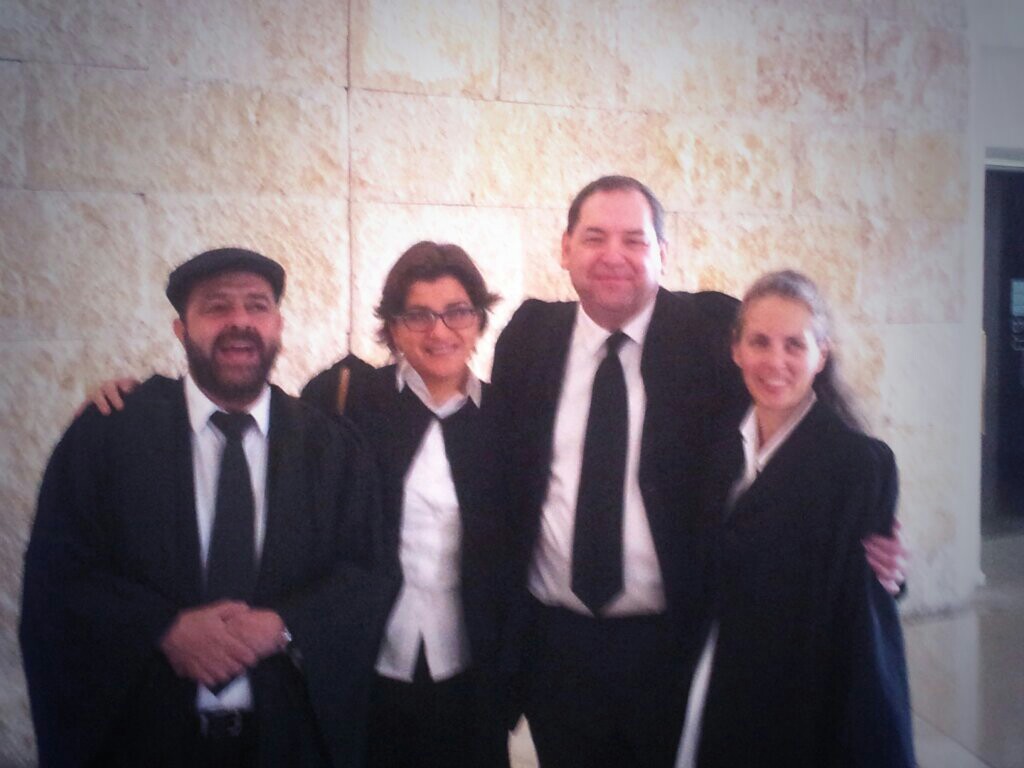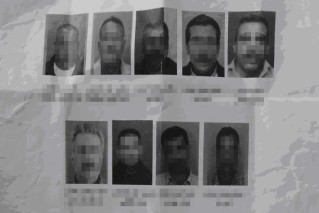
Rulings & Decisions
Equal Representation for Women & Arabs
On December 19, 2013, ACRI Attorney Nisreen Alyan filed a petition with the High Court of Justice regarding the failure of the Ministry of the Interior to appoint Arab members to their three committees of inquiry on redistricting and revenue sharing in the Negev. The petition argued that the failure to appoint Arabs to the committees constitutes a violation of the right to equal representation for Arab citizens in public bodies and committees.
The ministry committees were formed in July 2013 to examine the municipal boundaries of the regional and local councils in the Negev and their control over important “revenue generating” regions. Seven members were appointed to each of the inquiry committees, and none of them were Arab.
Following ACRI’s petition, the ministry notified the Court and ACRI that Arab representatives had already been appointed to all three of the committees, stating, “the Ministry of Interior accepts that there is a basis to appoint Arab members to the committees of inquiry,” and citing the “broad mandates of these committees and wide influence of their work.”
Attorney Alyan: “It is nice to discover that in this case the Minister of Interior was receptive to criticism and even acted to change the situation. I hope that gradually more and more government offices will internalize the importance of equal representation of minorities and disadvantaged groups – like Arabs and women – that have been excluded from the corridors of power and decision making for decades.”
For additional information on this petition, click here.
In a separate petition, ACRI appeared before the High Court of Justice on February 26, 2014 to demand the appointment of woman and Arab members to the Israel Lands Authority (ILA) Council.
The ILA council holds extraordinary executive power as the body responsible for 93% of the land in Israel. Of the ten current council members, there is just one woman, and no Arabs.
Supreme Court President Asher Grunis stated during the hearing that the lack of representation for Arab citizens and the under-representation of women on the ILA Council is unacceptable, and declared that if the state does not take steps to rectify the situation within 45 days, then the Court would issue an opinion without an additional hearing on the petition.
For additional information on this petition, click here.
Protecting the Right to Protest in Tel Aviv
Over the last two months, ACRI has been engaged in two cases regarding free speech and the right to protest in Tel Aviv. The first dealt with the right of protesters to erect a “protest tent” on municipal grounds, and the second with fees charged by municipal authorities for staging a demonstration.
On July 3, 2012, ACRI filed a petition with the Tel Aviv District Court against the municipality’s policy on erecting tents for the purpose of demonstrating.
The policy of the municipality was that to erect even a single tent in public space, potential demonstrators would be required to provide detailed information about the tent’s size and location, as well as procuring a municipal certificate and police and fire department approval, all of which require battling extensive red tape.
ACRI argued that municipal policy requiring a permit to erect a tent was a serious violation of freedom of expression and had no foundation in municipal law. The excessive bureaucratization of the municipality disproportionately undermines the fundamental right to free speech, thus reserving this key right only for those with the means to navigate the municipal labyrinth and pay a high fee.
The District Court dismissed the petition and ACRI appealed to the Supreme Court. In the lead up to the appeal, the municipality released a new set of guidelines, which in contrast to the arduous requirements currently imposed upon protesters, would require that protesters seeking to erect a tent simply give notice in writing to the authorities. At the hearing on February 26, the court gave the Tel Aviv Municipality 90 days to clarify its new procedures and present them to the court.
At a separate hearing at the Supreme Court on January 8, ACRI presented its position regarding the Tel-Aviv Municipality’s practice of charging exorbitant fees in order to approve public demonstrations at Rabin Square and other public locations. Supreme Court President Grunis criticized the habit of the municipality to collect payment for demonstrations in Rabin Square, citing the importance of the square as a symbol for protests.
ACRI Chief Legal Counsel, Attorney Dan Yakir: “the Supreme Court made clear in today’s hearing that the right to demonstrate is reserved for everyone, not just for the wealthy… The challenge for the municipality is now to ensure that it is publicly known that there is no longer any fee for conducting a public protest in Tel Aviv.”
Petitions & Interventions
Hearing for Anti-Boycott Law
On February 16, the High Court of Justice heard arguments regarding Israel’s Anti Boycott Law. The Anti Boycott Law, which went into effect in 2011, creates a private (civil) right of action for damages against individuals or organizations who call for a boycott of goods from Israeli settlements or of economic or cultural ties with Israel generally. The law allows plaintiffs to pursue a civil case without having to prove actual damages. It also permits the Minister of Finance to impose financial penalties, including the removal of tax exemptions, on anyone including NGOs that call for a boycott.
The petitioners, including ACRI, argued that the law imposes a “price tag” on legitimate political expression and harms public discourse on the most pressing and controversial issues. The severe sanctions authorized by the law create a chilling effect on speech that deters people from using a boycott to express a political stance – this violation of free speech is felt even in the absence of any actual sanctions having been imposed.
The petitioners argued in response to purported fears of financial harm being caused to people conducting business in the occupied territories: “If you choose to live in the Occupied Territories, then you have to deal with the consequences […] Boycotts are a part of democracy. They are a non-violent protest against the Occupation […] The law is causing harm to free speech in Israel today. We can’t waver due to hypothetical future consequences.”
The court will hand down its ruling over the coming months.
The petition was submitted by ACRI and Adalah and was heard alongside three other petitions on the same issue.
To read over ACRI’s live-tweets from the courtroom, follow us on Twitter at @acri_online.

The “Legal Dream Team” arguing against the Anti-Boycott Law.
Attorneys Gabi Lasky, Dan Yakir of ACRI, Sawsan Zaher & Hassan Jabareen of Adalah
Illegal “Wanted” Posters in West Bank Refugee Camp
At the end of December 2013, posters were hung in the Al-‘Arrub Refugee Camp in the West Bank with the pictures of 9 parents who have a child being held in a military prison facility or who has been arrested in the past. The names of the parents were written below their photograph alongside a threatening message asserting that if they do not prevent their children from participating in “acts of terror”, then “the IDF will be forced to intervene to stop the recurrence of these activities.” The warning included the sentence: “Stop them before it’s too late. Consider yourselves warned” and is signed by “Abu Salam” of “IDF Headquarters”.
In early January 2014, additional threatening posters were distributed at Al-’Arrub, but without pictures of the camp residents.
In response, ACRI and B’Tselem contacted the Legal Adviser of the IDF’s Judea and Samaria Division to demand the immediate cessation of the illegal distribution of these posters. ACRI Attorney Raghad Jaraisy and Noam Raz from B’tselem emphasized that there is no justification for such intimidating behavior. If the IDF possesses any information pertaining to illegal activity performed by the parents in the photos or their children, then it must initiate legal proceedings as opposed to resorting to intimidation and inciting fear.
In the absence of such legal proceedings, the publication of photographs of the residents, designed to incite fear within the camp, is a serious violation of privacy and dignity, and extends even to the level of persecution due to the implied threat that they are being targeted.

For more information on this phenomenon, and to read a complete translation of the posters, click here.
On December 29, 2013, the High Court of Justice rejected the seventh petition submitted by Mordechai Vanunu against the restraining orders issued against him since his release from prison in 2004. Mr. Vanunu was convicted of offenses against state security, specifically providing confidential information on the activities of the Nuclear Research Center (NRC), and was sentenced to 18 years in prison. Since his release, Mr. Vanunu has been subjected to a series of restraining orders that limit his movement and forbid him from meeting foreigners or leaving the country.
The Court ruled that it has reviewed the restraining orders several times in recent years, and has found time and again that they are necessary to protect national security.
Supreme Court President Grunis conceded that “there is a need to re-examine the necessity of the orders, and such review must take into account the passage of time … this assessment is necessary to ensure that the violation of the rights of the petitioner is proportionate given the sensitive information available to the petitioner and his motivation to disseminate it.”
The first of the series of petitions was submitted by ACRI. Since then, Mr. Vanunu has been represented by Attorneys Avigdor Feldman and Michael Sfard.
On January 12, 2014, the Tel Aviv District Court accepted an appeal by the National Association of GLBT in Israel against the judgment of the Tel Aviv Magistrate Court, which had dismissed a suit against the Makor Rishon newspaper on the charge that the newspaper had refused to publish an LGBT outreach advertisement. Both the appeal and the original suit were filed by the Human Rights Clinic at the Tel Aviv University Faculty of Law.
The trial court originally determined that the newspaper’s refusal should constitute an exception to anti-discrimination legislation. The law states that conduct shall not be considered discriminatory “when it is necessary by virtue of the character or nature of the product, public service or public place.” The newspaper had argued that in refusing to publish the advertisement, it was acting to protect its national-religious audience who may be confused in response to this outreach advertisement, especially as the plaintiff has no presence within the community.
The Tel Aviv District Court, however, did not agree that the newspaper’s conduct fell within this exception. The lower court was found to have erroneously linked the advertisement with homosexual intercourse without any basis. Rather, the advertisement was found to be modest, the sole purpose of which was to raise awareness and provide information to those seeking assistance.
Justice Ruth Lebhar-Sharon noted in her ruling that: “The content of this advertisement is insufficient to harm public sensibilities […] Newspapers play an integral role in facilitating public discourse, and as such are not a “regular” private enterprise.”
The Makor Rishon newspaper was ordered to pay compensation to the sum of NIS 50,000 in addition to NIS 10,000 of the Association’s legal costs.
To read a summary of these legal proceedings, click here.








